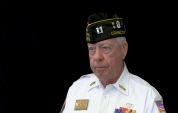3:55 | Rollie Sterrett describes the daily life in the Strategic Air Command's underground command facility. His job started at midnight, preparing the morning briefing for all strategic matters worldwide.
Keywords : Harold Rollie Sterrett Strategic Air Command (SAC) Vietnam Omaha NE William Westmoreland 7th Air Force National Security Agency (NSA) Defense Intelligence Agency (DIA) Central Intelligence Agency (CIA) State Department 544th Aerospace Reconnaissance Technical Wing Russia China Bruce K. Holloway Noel Gayler

It was a turbulent time to come of age in the 1960's. Rollie Sterrett majored in political science because of all the history unfolding around him and he was attracted to the military because he craved adventure.
Rollie Sterrett was vaguely aware of the war in Vietnam, which was really just beginning. At the Air Intelligence Training Center, he learned photo interpretation using photos from the Cuban missile crisis. Upon graduation, the entire class was informed they were all going to Vietnam
When Rollie Sterrett got to Vietnam, he initially had to squeeze with seven others into a Saigon hotel room while they waited for assignment. He was assigned to the Directorate of Targets at 7th Air Force HQ, where he learned the intricate inter-service politics at play in the air war. He also soon shared the frustration with the micro-management of the war coming from the White House.
The air war over Vietnam was highly politicized. President Johnson was concerned that China could enter the war, the way they did in Korea. This led to every target requiring approval from the White House itself. Air Force intelligence officer Rollie Sterrett says this led to missed opportunities to easily destroy enemy capabilities.
Bomb damage assessments were important to the generals guiding the war in Vietnam. Photo interpreter Rollie Sterrett was trained to determine if targets had been destroyed and this led to his assignment as the 7th Air Force briefing officer to Gen. William Westmoreland, who was in command of all forces in Vietnam. The other briefers were flag officers, but he was just a lowly 2nd Lieutenant.
Each service was responsible for a certain part of the air war in Vietnam and the inter-service politics caused a lot of stress, recalls Air Force intelligence officer Rollie Sterrett. He was the Air Force's briefing officer for Gen. William Westmoreland's daily briefings. The famous general and the young lieutenant took a liking to each other.
As a young lieutenant, Rollie Sterrett's assignment put him in daily contact with Gen. William Westmoreland. He was overwhelmed by the man, at first, but a friendly, respectful relationship grew over time. He observed that the general was hampered by the extreme political restraints of the war and that he was undeserving of his treatment by the US news media.
If an air unit failed to take out the target in a strike over North Vietnam, the same unit was obligated to return and finish the job. Rollie Sterrett was only a Lieutenant as he elbowed his way through pilots, who were colonels, to get to a table full of photographs. He was a photo interpreter and Gen. Wesmoreland's briefing officer. They gave way. (Warning: strong language.)
The rules of engagement in Vietnam were frustrating, and the fact that it took 36 hours to get a target approved by the White House and precious few of them were approved, meant that we were fighting the war with our arms tied. That is the observation of Rollie Sterrett, who was there trying to get targets approved.
Air Force photo interpreter and briefing officer Rollie Sterrett was fortunate to not experience any of the disrespect that many returning veterans had to face. He attributes this to going straight to an intense military environment right away, Strategic Air Command headquarters.
After his Vietnam tour, Air Force photo interpreter Rollie Sterrett was transferred to the Strategic Air Command and assigned to the photo reconnaissance wing. He soon caught the eye of the new SAC commander and became the daily briefing officer for SAC with an emphasis on B-52 operations in Vietnam.
During his time at the Strategic Air Command, Rollie Sterrett had to give private briefings to a Navy Admiral who wasn't allowed in the general briefings due to arcane inter-service politics. The first question from the admiral forced Rollie to make a delicate choice, but he chose well.
At the time, Rollie Sterrett thought you had to be a pilot to advance in his specialty in the Air Force intelligence community. That turned out not to be the case, but he had no regrets leaving the service for a successful private life.